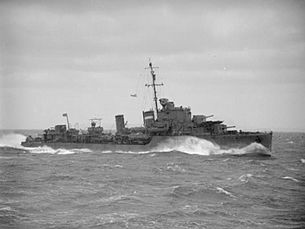Convoy QP 13 facts for kids
Convoy QP 13 was a group of ships that sailed together during the Second World War. This journey was part of the important Arctic convoys. These convoys helped deliver supplies during the war.
QP 13 was the thirteenth convoy heading west. It sailed from the Arctic ports of Arkhangelsk and Murmansk in the Soviet Union. Its destination was the United Kingdom, Iceland, and North America.
Contents
What Was Convoy QP 13?
Convoy QP 13 included 35 merchant ships. Most of these ships had arrived earlier with Convoy PQ 16. They were returning home, often empty, after delivering war supplies to the Soviet Union. Some Soviet ships, however, carried timber as cargo.
Ships Protecting the Convoy
The convoy had a strong escort to protect it from enemy attacks. This escort included:
- Five destroyers: Achates, Garland, Inglefield, Intrepid, and Volunteer.
- Two minesweepers (ships that clear mines): Hussar and Niger.
- Four corvettes (smaller warships): Honeysuckle, Hyderabad, Roselys, and Starwort.
- An anti-aircraft ship: Alynbank.
The leader of the convoy, called the Convoy Commodore, was Captain NH Gale. He was aboard the ship Empire Selwyn.
The Larger Covering Force
Convoy QP 13 sailed at the same time as another convoy, convoy PQ 17, which was heading east. Both convoys received protection from a very large naval force. This force included:
- The British aircraft carrier Victorious.
- The battleship Duke of York.
- Cruisers Cumberland and Nigeria.
- Seven destroyers: Ashanti, Douglas, Faulknor, Marne, Martin, Onslaught, and Onslow.
- The American battleship USS Washington.
- American destroyers Mayrant and Rhind.
Admiral John Tovey commanded this powerful covering force from his flagship, the Duke of York.
The Journey of Convoy QP 13
Convoy QP 13 began its journey from Arkhangelsk on June 26, 1942. It was first joined by a local escort of Soviet destroyers and British minesweepers. These ships helped protect the convoy as it started its voyage.
Changes in Escort Ships
On June 29, the local escort ships were replaced. New anti-aircraft destroyers, known as Hunt class class, joined the convoy. These were Blankney, Middleton, and Wheatland.
German Forces Ignore the Convoy
On June 30, German planes spotted Convoy QP 13. A German submarine, U-88, also began to follow the convoy by July 2. However, the German naval command decided to focus their attacks on the eastbound Convoy PQ 17. This meant that Convoy QP 13, which was mostly carrying empty ships, was largely ignored by the Germans. The Hunt-class destroyers left the convoy on July 4, once it was out of range of German bombers.
Tragedy in the Fog
On July 5, 1942, the convoy ran into thick fog. Visibility was very poor. The minesweeper Niger made a mistake, thinking an iceberg was a landmark in Iceland. Six merchant ships followed Niger into a minefield. This minefield, called SN72, had been laid by the British a month earlier.
All seven ships hit naval mines. The Niger sank, and only eight of its 127 crew members survived. The ship Exterminator was damaged but could be saved. No crew were lost from Exterminator, Hybert, or Rodina. However, one crewman died from Hefron. Five sailors drowned when John Randolph broke in two. The ship Massmar sank, taking with it 17 merchant seamen, 5 Naval Armed Guards, and 26 survivors it had rescued from another sinking.
The surviving ships that were heading to Reykjavík arrived safely on July 7. They were escorted into port by two naval trawlers, Saint Elstan and Lady Madeleine.
Ships Involved in Convoy QP 13
| Ship | Tonnage (GRT) | Flag | Notes |
|---|---|---|---|
| Alma Ata | 3,611 | timber cargo | |
| American Press | 5,131 | ||
| American Robin | 5,172 | ||
| Archangle | 2,480 | timber cargo | |
| Atlantic | 5,414 | ||
| Budenni | 2,482 | timber cargo | |
| Capira | 5,625 | ||
| Chumleigh | 5,445 | ||
| City of Omaha | 6,124 | ||
| SS Empire Baffin | 6,978 | ||
| Empire Mavis | 5,704 | ||
| Empire Meteor | 7,457 | ||
| Empire Selwyn | 7,167 | Convoy Commodore's ship | |
| Empire Stevenson | 6,209 | general cargo with lumber | |
| Exterminator | 6,115 | Damaged by British Northern Barrage minefield SN72 | |
| Heffron | 7,611 | Sunk by British Northern Barrage minefield SN72 | |
| Hegira | 7,588 | ||
| Hybert | 6,120 | Sunk by British Northern Barrage minefield SN72 | |
| John Randolph | 7,191 | Liberty ship; sunk by British Northern Barrage minefield SN72 | |
| Komiles | 3,962 | timber cargo | |
| Kuzbass | 3,109 | ||
| Lancaster | 7,516 | ||
| Massmar | 5,828 | Sunk by British Northern Barrage minefield SN72 | |
| Mauna Kea | 6,064 | ||
| Michigan | 6,419 | ||
| Mormacrey | 5,946 | ||
| Mount Evans | 5,598 | ||
| Nemaha | 6,501 | ||
| Petrovski | 3,771 | timber cargo | |
| Pieter de Hoogh | 7,168 | ||
| Richard Henry Lee | 7,191 | Liberty ship | |
| Rodina | 4,441 | Sunk by British Northern Barrage minefield SN72 | |
| St. Clears | 4,312 | ||
| Stary Bolshevik | 3,974 | ||
| Yaka | 5,432 |
 | Misty Copeland |
 | Raven Wilkinson |
 | Debra Austin |
 | Aesha Ash |


